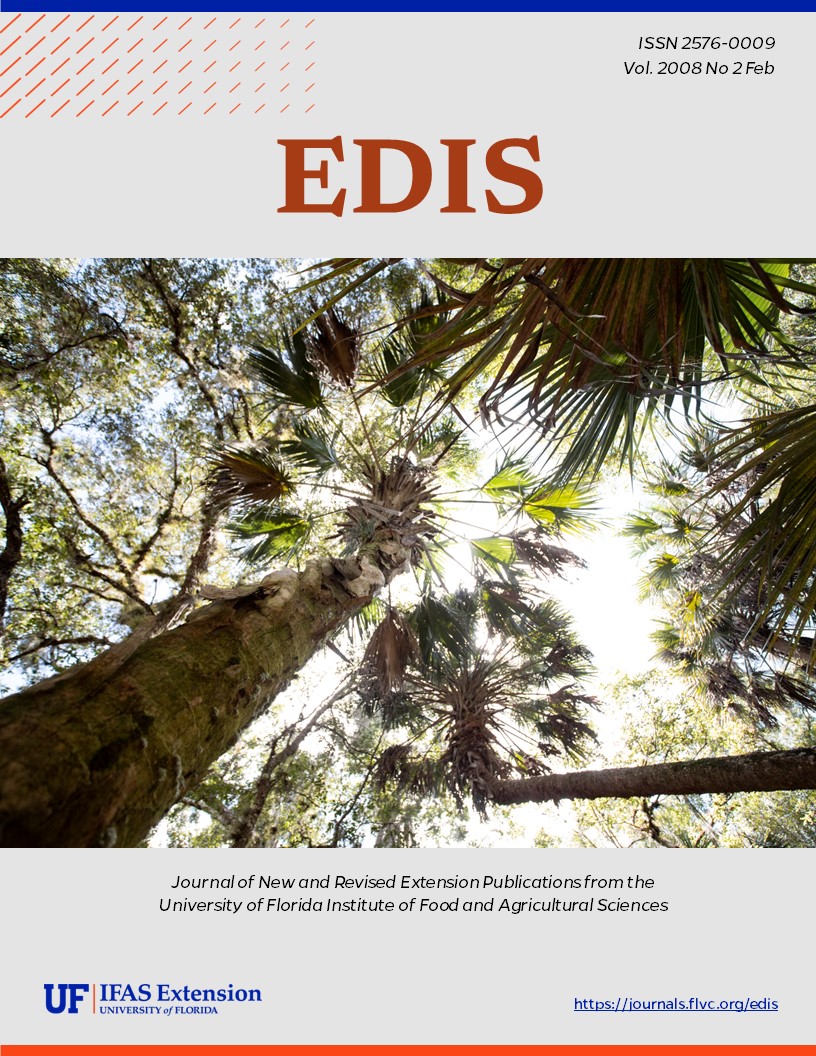Abstract
ENH-1085, a 9-page illustrated fact-sheet by Robert Stamps, describes this increasingly problematic weed — also known as jio, tropical spiderwort, hairy wandering jew, and Indian dayflower — in field nurseries, its identification, control, factors effecting pre- and post-emergence herbicides, tables of recommended herbicides, and references. Published by UF Department of Environmental Horticulture, January 2008.
References
Budd, G. D., P. E. L. Thomas, and J. C. S. Allison. 1979. Vegetative regeneration, depth of germination and seed dormancy in Commelina benghalensis L. Rhodesian Journal of Agricultural Research 17:151-153.
Culpepper, A., J. Flanders, A. C. York, and T. M. Webster. 2004. Tropical spiderwort (Commelina benghalensis) control in glyphosate-resistant cotton. Weed Technology 18:432-436. https://doi.org/10.1614/WT-03-175R
de Souza Lacerda, A. L. and R. Victoria Filho. 2004. Dose-response curves in weed species with the use of herbicide glyphosate. Bragantia 63:73-79. https://doi.org/10.1590/S0006-87052004000100008
Faden, R. B. 1993. The misconstrued and rare species of Commelina (Commelinaceae) in the eastern United States. Annals of the Missouri Botanical Garden 80:208-218. https://doi.org/10.2307/2399824
Ferrell, J. A., G. E. MacDonald, and B. J. Brecke. 2006. Tropical Spiderwort (Commelina benghalensis L.), Identification and Control. University of Florida, Institute of Food and Agricultural Sciences, Florida Cooperative Extension Service Publication SS-AGR-223:
Maheshwari, P. and J. Maheshwari. 1955. Floral dimorphism in Commelina forskalaei Vahl. and C. benghalensis L. Phytomorphology [Delhi] 5:413-422.
Olabiyi, T. I. and G. O. Adesina. 2006. Weed as host of plant parasitic nematodes. Crop Research Hisar 32:512-516.
Prostko, E. P., A. S. Culpepper, T. M. Webster, and J. T. Flanders. 2005. Tropical Spiderwort Identification and Control in Georgia Field Crops. Cooperative Exte nsion Service/University of Georgia College of Agricultural and Environmental Sciences Circular 884.
Steptoe, P. J., W. K. Vencill, and T. L. Grey. 2006. Influence of moisture stress on herbicidal control of an invasive weed, Benghal dayflower (Commelina benghalensis). Journal of Plant Diseases and Protection Special Issue 20:907-914.
Walker, S. R. and J. P. Evenson. 1985a. Biology of Commelina benghalensis L. in south-eastern Queensland. 1. Growth, development and seed production. Weed Research 25:239-244. https://doi.org/10.1111/j.1365-3180.1985.tb00640.x
Walker, S. R. and J. P. Evenson. 1985b. Biology of Commelina benghalensis L. in south-eastern Queensland. 2. Seed dormancy, germination and emergence. Weed Research 25:245-250. https://doi.org/10.1111/j.1365-3180.1985.tb00641.x

